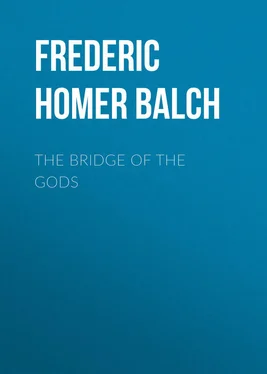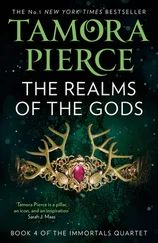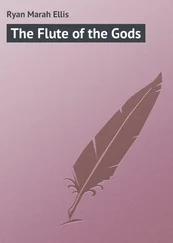Frederic Balch - The Bridge of the Gods
Здесь есть возможность читать онлайн «Frederic Balch - The Bridge of the Gods» — ознакомительный отрывок электронной книги совершенно бесплатно, а после прочтения отрывка купить полную версию. В некоторых случаях можно слушать аудио, скачать через торрент в формате fb2 и присутствует краткое содержание. ISBN: , Жанр: foreign_antique, foreign_prose, на английском языке. Описание произведения, (предисловие) а так же отзывы посетителей доступны на портале библиотеки ЛибКат.
- Название:The Bridge of the Gods
- Автор:
- Жанр:
- Год:неизвестен
- ISBN:http://www.gutenberg.org/ebooks/28815
- Рейтинг книги:3 / 5. Голосов: 1
-
Избранное:Добавить в избранное
- Отзывы:
-
Ваша оценка:
- 60
- 1
- 2
- 3
- 4
- 5
The Bridge of the Gods: краткое содержание, описание и аннотация
Предлагаем к чтению аннотацию, описание, краткое содержание или предисловие (зависит от того, что написал сам автор книги «The Bridge of the Gods»). Если вы не нашли необходимую информацию о книге — напишите в комментариях, мы постараемся отыскать её.
The Bridge of the Gods — читать онлайн ознакомительный отрывок
Ниже представлен текст книги, разбитый по страницам. Система сохранения места последней прочитанной страницы, позволяет с удобством читать онлайн бесплатно книгу «The Bridge of the Gods», без необходимости каждый раз заново искать на чём Вы остановились. Поставьте закладку, и сможете в любой момент перейти на страницу, на которой закончили чтение.
Интервал:
Закладка:
“Duty,” he murmured, “always duty, never love. Well, the fault is my own that we were ever married. God help me to be true and kind to her always. She shall never know that I miss anything in her.”
And he preached to his congregation that afternoon a sermon on burden-bearing, showing how each should bear his own burden patiently, – not darkening the lives of others by complaint, but always saying loving words, no matter how much of heartache lay beneath them. He told how near God is to us all, ready to heal and to strengthen; and closed by showing how sweet and beautiful even a common life may grow through brave and self-sacrificing endurance of trouble.
It was a helpful sermon, a sermon that brought the listeners nearer God. More than one heart was touched by those earnest words that seemed to breathe divine sympathy and compassion.
He went home feeling more at peace than he had done for many days. His wife’s room was still, as he entered it. She was in her easy-chair at the window, lying back among the pillows asleep. Her face was flushed and feverish, her long lashes wet with tears. The wraps had fallen away from her, and he stooped over to replace them. As he did so her lips moved in her half-delirious slumber, and she murmured some name sounding like his own. A wild throb of joy thrilled through him, and he bent closer to listen. Again she spoke the name, spoke it sorrowfully, longingly. It was the name of her lover drowned at sea.
The long, nervous fingers that held the half-drawn wraps shook convulsively as with acutest pain, then drew the coverings gently around her.
“God help her, God help her!” he murmured, as he turned softly away, his eyes filling with tears, – tears for her sorrow rather than his own.
CHAPTER III
A DARKENED FIRESIDE
… Her way is parted from my way;
Out of sight, beyond light, at what goal may we meet?
Ruth was much worse in the evening, but at last, after Cecil had watched at her side till a late hour, she sank into a troubled sleep. Then the old Indian servant insisted on taking his place at the sufferer’s bedside, for she saw that he was much worn by the labors of the day and by anxiety for his wife. At first he refused; but she was a skilled nurse, and he knew that the invalid would fare better in her hands than his own, so at last he consented on condition that she would call him if his wife grew worse. The woman promised, and he withdrew into the library, where a temporary bed had been made for him. At the door he turned and looked back.
His wife lay with closed eyes and flushed face amid the white pillows. The robe over her breast stirred with her difficult breathing, and her head turned now and then from side to side while she uttered broken, feverish words. By her sat the swarthy nurse, watching her every movement and ready with observant eye and gentle touch to minister to all her needs.
A yearning tenderness and pity came into his gaze. “Poor child, poor child!” he thought. “If I could only make her well and happy! If I could only bring her dead lover back to life, how gladly would I put her in his arms and go away forever!” And it seemed to him in some dim way that he had wronged the poor sufferer; that he was to blame for her sorrow.
He went on into the library. A lamp was burning on the table; a Hebrew Bible and a copy of Homer lay beside it. Along the walls were arranged those heavy and ponderous tomes in which the theology of the age was wont to clothe itself.
He seated himself at the table and took up his Homer; for he was too agitated to sleep. But it was in vain that he tried to interest himself in it. The rhythm had lost its music, the thought its power; it was in vain that he tried to forget himself in the reply of Achilles, or the struggle over the body of Patroclus.
Hawthorne tells us that a person of artistic temperament may at a time of mental depression wander through the Roman galleries and see nothing in the finest masterpieces of Raphael or Angelo. The grace is gone from the picture, the inspiration from the marble; the one is a meaningless collection of colors, the other a dull effigy carved in stone.
Something of this mood was on Cecil to-night. Irresponsive to the grand beauty of the poem he felt only its undertone of heartache and woe.
“It is like human life,” he thought, as he listlessly turned the pages; “it is bright on the surface, but dark and terrible with pain below. What a black mystery is life! what bitter irony of justice! Hector is dragged at Achilles’ chariot-wheel, and Paris goes free. Helen returns to her home in triumph, while Andromache is left desolate. Did Homer write in satire, and is the Iliad but a splendid mockery of justice, human and divine? Or is life so sad that every tale woven of it must needs become a tragedy?”
He pondered the gloomy puzzle of human existence long that night. At length his brain grew over-weary, and he slept sitting in his chair, his head resting on the pages of the open book.
How long he slept he knew not, but he awoke with a start to find a hand laid on his shoulder and the tall figure of the Indian woman standing beside him. He sprang up in sudden fear.
“Is she worse?” he cried. But the woman, with that light noiseless step, that mute stolidity so characteristic of her race, had already glided to the door; and there was no need for her to answer, for already his own apprehensions had replied.
He was in the room almost as soon as she. His wife was much worse; and hastening through the night to a neighboring farmhouse, he roused its inmates, despatched a messenger for the physician, and returned, accompanied by several members of the neighbor’s family.
The slow moments dragged away like years as they watched around her. It seemed as if the doctor would never come. To the end of his life Cecil never forgot the long-drawn agony of that night.
At length their strained hearing caught the quick tread of horses’ hoofs on the turf without.
“The doctor, the doctor!” came simultaneously from the lips of Cecil and the watchers. The doctor, – there was hope in the very name.
How eagerly they watched his face as he bent over the patient! It was a calm, self-contained face, but they saw a shadow flit over it, a sudden almost imperceptible change of expression that said “Death” as plainly as if he had spoken it. They could do nothing, he said, – nothing but wait for the end to come.
How the moments lingered! Sometimes Cecil bent over the sufferer with every muscle quivering to her paroxysms; sometimes he could endure it no longer and went out into the cool night air or into the library, where with the mere mechanical instinct of a student he picked up a book, reading a few lines in it, then throwing it aside. Yet wherever he was he felt her sufferings as acutely as when standing by her side. His whole frame was in keenest sympathy with hers, his whole being full of pain. So sharp were his sensations that they imparted an abnormal vigor to his mind. Every line his eyes met in reading stood out on the page with wonderful distinctness. The words seemed pictorial, and his mind grasped abstruse propositions or involved expressions with marvellous facility.
He noted it, and remembered afterward that he thought at the time how curious it was that his tortured sympathies should give him such startling acuteness of perception.
The slow night waned, the slow dawn crept over the eastern hills. Cecil stood with haggard eyes at the foot of the bed, watching the sleeper’s face. As the daylight brightened, blending with the light of the still burning lamps, he saw a change come over her countenance; the set face relaxed, the look lost its wildness. A great hope shone in his hollow eyes.
Читать дальшеИнтервал:
Закладка:
Похожие книги на «The Bridge of the Gods»
Представляем Вашему вниманию похожие книги на «The Bridge of the Gods» списком для выбора. Мы отобрали схожую по названию и смыслу литературу в надежде предоставить читателям больше вариантов отыскать новые, интересные, ещё непрочитанные произведения.
Обсуждение, отзывы о книге «The Bridge of the Gods» и просто собственные мнения читателей. Оставьте ваши комментарии, напишите, что Вы думаете о произведении, его смысле или главных героях. Укажите что конкретно понравилось, а что нет, и почему Вы так считаете.












